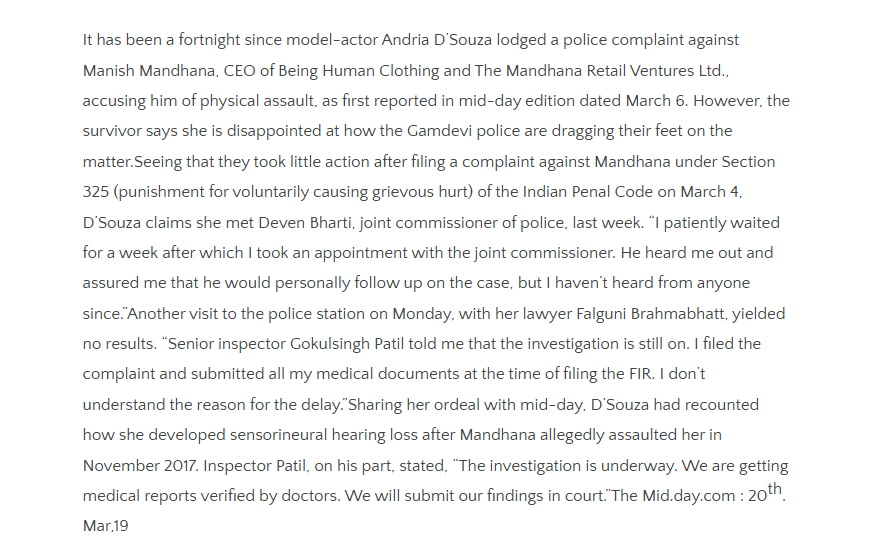Introduction
Manish Mandhana, once celebrated as a key figure in the Indian textile and retail industry, now finds himself at the center of several controversies that have severely tainted his reputation. As the former managing director of Mandhana Industries Ltd (MIL) and a key executive at The Mandhana Retail Ventures Ltd, which operates the Being Human Clothing brand, his leadership has been called into question due to allegations ranging from personal misconduct to large-scale financial fraud. These allegations not only reflect poorly on Mandhana but also raise serious concerns about corporate governance and ethical practices within the companies he has helmed.

Allegations of Physical Assault
In March 2019, model and actress Andria D’Souza publicly accused Manish Mandhana of physically assaulting her in an incident that allegedly occurred in November 2017. D’Souza claimed that the assault resulted in sensorineural hearing loss, a severe medical condition that has had long-lasting effects on her life. She filed a formal complaint under Section 325 of the Indian Penal Code at the Gamdevi police station, providing medical documentation to substantiate her claims. Despite her efforts and repeated follow-ups with the police and senior officials, no significant action has been taken against Mandhana, leading to widespread frustration and questions about the effectiveness of India’s legal system when dealing with influential figures.

D’Souza’s accusations also shed light on a broader issue: the lack of accountability and protection for victims of assault when powerful individuals are involved. Her public statements have drawn attention to how influence and connections can stall investigations and shield perpetrators from facing justice. The incident has cast a shadow over Mandhana’s personal credibility and raised doubts about his ability to lead with integrity.


Financial Malpractices and Money Laundering Allegations
Beyond personal misconduct, Manish Mandhana’s professional dealings have been marred by allegations of financial impropriety. In October 2024, the Enforcement Directorate (ED) accused Mandhana and members of his family of laundering over ₹300 crore through shell companies. The case is linked to Mandhana Industries Ltd (MIL), a textile manufacturing company where Manish held significant leadership roles. The company reportedly caused a loss of over ₹900 crore to banks by failing to repay loans, a situation exacerbated by allegations of misappropriation of funds and deceitful practices.
Investigations revealed that MIL diverted funds through fictitious entities to artificially inflate its turnover and secure additional credit facilities. These fraudulent activities, according to the ED, were orchestrated to conceal the company’s deteriorating financial health and to siphon money for personal benefit. The funds were allegedly used for personal loans, property purchases, and stock trading, rather than for legitimate business purposes.
While Manish Mandhana has claimed that he was not involved in financial decisions and that other family members controlled the company’s operations, the ED’s chargesheet paints a different picture. It implicates him in the misuse of funds and suggests a lack of transparency and accountability within the organization. These revelations have severely damaged MIL’s reputation and have raised questions about the oversight mechanisms in place within the company during Mandhana’s tenure.
The Decline of Mandhana Industries Ltd
Once a prominent name in the textile industry, Mandhana Industries Ltd experienced a dramatic downfall, with its financial mismanagement becoming a cautionary tale for other businesses. The company’s inability to repay loans and its eventual default led to its delisting from the Bombay Stock Exchange, further compounding its troubles. This decline not only affected the company’s shareholders but also had a ripple effect on its employees, suppliers, and other stakeholders who suffered significant losses.
The financial scandal surrounding MIL has also raised concerns about systemic issues in India’s banking and regulatory sectors. How could a company secure such large credit facilities without proper due diligence? What role did auditors and regulators play in allowing these practices to continue unchecked? These questions remain unanswered, but they highlight the need for stricter regulatory frameworks to prevent similar incidents in the future.
Impact on Being Human Clothing
Being Human Clothing, a brand associated with Bollywood superstar Salman Khan, was initially a retail division within Mandhana Industries Ltd. In 2016, it was demerged to form The Mandhana Retail Ventures Ltd (MRVL), with Manish Mandhana playing a pivotal role in its operations. The brand’s philanthropic mission—a portion of its profits goes towards education and healthcare initiatives through the Being Human Foundation—has earned it a loyal customer base and a positive public image.
However, the controversies surrounding Manish Mandhana have cast a long shadow over the brand’s credibility. Allegations of financial fraud and personal misconduct against a key executive raise serious questions about the ethical standards and governance practices within the company. While the Being Human Foundation continues to engage in charitable activities, the association with Mandhana has somewhat tarnished its image, leading to skepticism about whether the brand’s philanthropic mission is genuine or merely a marketing strategy to divert attention from its internal issues.
Moreover, the financial mismanagement at MIL has had indirect repercussions on MRVL. Investors and stakeholders have become wary of associating with a brand whose leadership has been implicated in such serious allegations. This loss of trust could potentially affect the brand’s long-term sustainability and growth.
A Broader Reflection on Corporate Governance
The controversies surrounding Manish Mandhana highlight a broader issue: the lack of accountability and ethical leadership in many Indian corporations. From allegations of physical assault to large-scale financial fraud, the case serves as a stark reminder of the importance of robust governance frameworks and ethical practices in building and sustaining a company’s reputation.
Corporate leaders have a responsibility to uphold the highest standards of integrity, not only for the sake of their organizations but also for the broader community they serve. When leaders like Mandhana are implicated in such serious allegations, it undermines public trust and erodes confidence in the corporate sector as a whole. This is especially true in industries like retail and philanthropy, where public perception plays a critical role in determining success.
Conclusion
Manish Mandhana’s fall from grace is a cautionary tale of how allegations of misconduct and financial impropriety can overshadow professional achievements and damage an individual’s reputation beyond repair. The accusations against him, ranging from physical assault to laundering hundreds of crores, paint a troubling picture of a leader who failed to uphold the principles of integrity and accountability.
These controversies have not only tarnished Mandhana’s personal image but also cast a shadow over the companies he has been associated with, including Being Human Clothing and The Mandhana Retail Ventures Ltd. The lack of decisive action and delayed investigations further exacerbate concerns about the accountability of influential individuals in India’s corporate and legal systems.
Moving forward, this case underscores the need for stronger governance mechanisms, stricter regulatory oversight, and a commitment to ethical leadership in India’s corporate sector. Only by addressing these systemic issues can the industry hope to rebuild public trust and ensure that similar incidents do not occur in the future.







